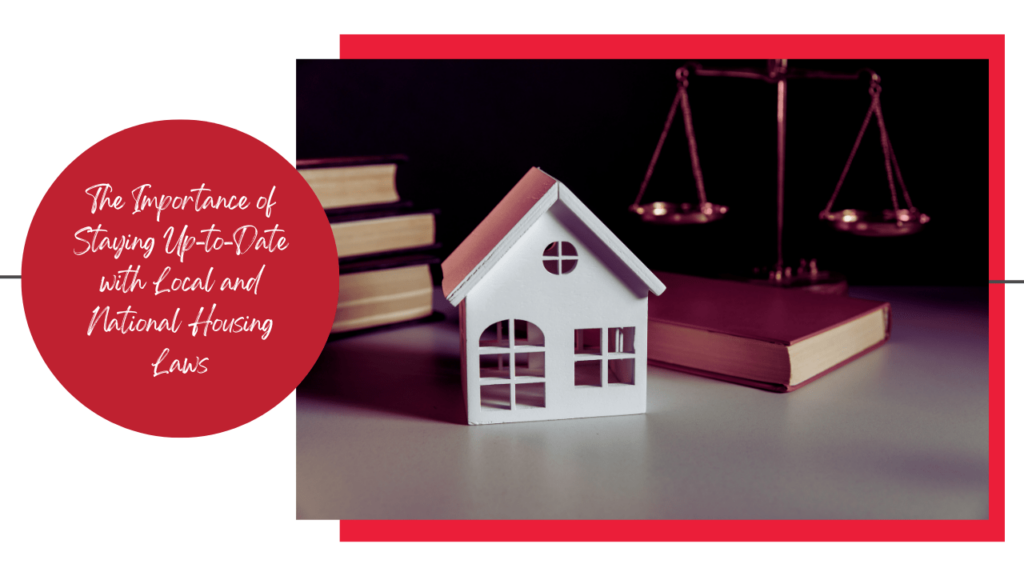
How diligently are you keeping up with California’s rental laws?
The federal laws are important, too, of course, but you’ll find that our state laws are often stricter and more complex than what is on the books nationally. The Fair Housing Act, for example, does not go as far as California’s fair housing laws.
There’s a bit of risk involved when you rent out Santa Rosa properties to tenants. It’s easy to make a mistake. If your lease agreement does not contain the necessary language or your marketing materials make it seem like you’re looking for a very specific tenant, you could find yourself in trouble. This trouble is usually expensive. A fair housing violation, for example, starts at a $16,000 fine for your first offense.
There are a number of laws that dictate how you lease your rental properties, manage them, and maintain them. Laws govern how you work with your residents and what your responsibilities are when it comes to the property and those relationships.
As an investor, it’s in your best interests to partner with a professional Santa Rosa property manager who can keep you compliant and protected. Property managers invest in continuing education and work closely with attorneys and other experts to ensure all state, federal, and local laws are followed and understood.
Your tenants are well-protected and informed about their rights. You need to be informed, too, and you need to protect yourself.
You know it’s important to stay up to date. Here are some of the laws that require your closest attention, and why you might be missing the mark.
Fair Housing Laws
It’s important to understand fair housing laws because discrimination is completely illegal and unacceptable. Even if you do not discriminate intentionally, the way you advertise your home, screen your applicants, or even speak to your tenants could be perceived as unjust.
Get to know the Federal Fair Housing Act. Get to know the Fair Credit Reporting Act and the Americans with Disabilities Act. These are important benchmarks that show you exactly what you can and cannot do when it comes to renting out property to tenants.
Once you’ve familiarized yourself with the federal laws, turn your attention to the state laws. They’re stricter, and they cover more protected classes. California’s fair housing laws prohibit discrimination when it comes to leasing, screening, and managing your rental property based on:
- Race
- Skin color
- Religion or creed
- National origin or ancestry.
- Sex
- Physical or mental disability
- Familial status
- Sexual orientation
- Age
- Gender identification
- Gender expression
- Veteran or military status
- Citizenship
- Primary language
- Marital status
- Source of income
- Genetic information
This list is always evolving. It is essential that when you rent out a property, you keep up on all fair housing laws at a state, local, and federal level.
Section 8 Tenants and Screening Criteria
The Tenant Protection Act of 2019 is mostly known for its rent control and eviction provisions, and we’ll talk about those in a moment. But, that’s not all the law contains. This law also concerns Section 8 tenants and renters who benefit from housing voucher programs. You need to understand why it’s essential to consider all applicants, regardless of how they earn their income. Those housing vouchers used by Section 8 tenants can be legally considered a source of income.
This impacts how you market your rental property and screen your potential tenants. In the past, you could actively advertise that you did not accept Section 8 tenants for a property. There was some distinction about whether certain units were approved for Section 8. You cannot make this distinction anymore.
Make sure your qualifying rental criteria is written and updated. All of your screening criteria can remain the same, but when it comes to your income standards, you have to consider a housing voucher as part of an applicant’s income.
Rent Control and whether it Applies to Your Santa Rosa Rental Home
You need to know the rent control laws in California because they impact when and how you raise your rent. Most importantly, they dictate how much you can increase your rent.
Statewide rent control went into effect on January 1, 2020, and that new statewide rent control law applies to most, but not all rental properties throughout the state of California. If your rental home is a multi-family property that is at least 15 years old, you are likely bound by rent control restrictions. Most single-family homes and condos are exempt unless they’re owned in part by a corporation.
Rent control limits and requirements caps rental increases to five percent plus the annual cost of living increase set by the Consumer Price Index.
If your property is exempt from rent control, you still need to pay attention to the limits and the market. You also have to inform tenants that you’re exempt. Your lease agreement must reflect whether your property is bound by the statewide rent control law. The language has to be specific, so make sure you have the correct verbiage, which can easily be provided by a local Santa Rosa property manager.
Just Cause Evictions in Santa Rosa
Evictions in Santa Rosa are not easy. You’ll need a good reason to evict, and you’ll need a close understanding of how the process works.
The law requires you to have just cause if you want to terminate a tenancy and not renew a lease agreement.
Legally, there are actually 16 different just causes for eviction in Santa Rosa:
- Nonpayment of rent.
- Lease violation that has not been corrected after written notice.
- Nuisance or substantial damage to the unit.
- Illegal use of the unit.
- Tenant refuses to execute a written extension after the lease ends.
- Refusal to grant the landlord access to the unit as required by law.
- Unapproved subtenant living in the unit.
- Landlord or close relative of the landlord needs to move into the unit.
- Sale of a unit which has been converted to a condo.
- Demolition or removal of the unit from housing use.
- Capital improvements or rehabilitation.
- Substantial rehabilitation of a building that is essentially uninhabitable.
- Ellis Act evictions which require withdrawal from rental housing use all of the units in the building.
- Lead abatement.
- Demolition.
- Good Samaritan Occupancy Status for the tenant expires.
In some of these cases, a tenant relocation payment will be required. This is the equivalent of one month’s rent.
If you’re evicting for nonpayment of rent or because a lease violation or criminal activity has occurred, you’ll want to follow the legal steps set forth in the landlord and tenant laws. There are specific timelines and forms that need to be filed. Every detail is critical. Don’t evict on your own. Get help from a property manager, who can refer you to an attorney.
Security Deposits Laws in Santa Rosa
Security deposit laws are complex, and you’ll want to make sure your process of collecting, holding, and returning a security deposit is well-documented.
Mistakes with security deposits are common, and they can also be expensive. You don’t want to find yourself in court because you made a mistake or waited too long to return a deposit.
There’s a limit to what you can collect in a security deposit. Santa Rosa landlords may collect up to two months’ rent for an unfurnished property. If you’re renting out a furnished home, that limit goes up to three times the monthly rent.
Security deposits are always refundable in California.
Most important is how you return your tenant’s deposit at the end of a lease term. You will have 21 days from the date that your tenant moves out to return the security deposit and/or an itemized accounting of why money was withheld and what it’s being used for.
Remember what you can and cannot use the deposit to cover. You can use the deposit for damage, unpaid rent, and unpaid utilities. You can use it to clean the unit. You cannot use the security deposit to make repairs and replacements that are normal wear and tear items.
Habitability and Right to Quiet Enjoyment
Two more laws that need your attention, which you might not give a lot of thought to:
-
- Habitability. In California, there’s an implied warranty of habitability, which means that when you rent out your home, it has to be safe and habitable. It cannot pose a danger or any kind of risk. You need to have hot water, electricity, and a roof that doesn’t leak. Ventilation has to be clean and safe. There cannot be pest infestations and you cannot allow gas leaks or sewer backups.
- Tenant’s Right to Quiet Enjoyment. Yes, you own the property. But, it’s not your home. It’s your tenant’s home, and your tenants have a right to privacy. They have a right to quiet enjoyment. You cannot show up for no reason and expect to get inside the property. You cannot enter at all unless there’s an emergency, a maintenance need, or because you’re showing the property. You have to provide at least 24 hours of notice.
 Remaining in compliance with all of these laws can be a challenge. If you’d like some help, we’re the Santa Rosa property management experts that can help. Please contact us at Redwood Residential Property Management, and we’ll help you stay in compliance.
Remaining in compliance with all of these laws can be a challenge. If you’d like some help, we’re the Santa Rosa property management experts that can help. Please contact us at Redwood Residential Property Management, and we’ll help you stay in compliance.




 Graduate of Empire Business School, Santa Rosa in 1998 with an AA degree in Office Administration. Lorena has over 30 years of experience in office administration. From the California State Legislature to North Bay Realtors Association and most recently with Sue Carrell & Associates.
Graduate of Empire Business School, Santa Rosa in 1998 with an AA degree in Office Administration. Lorena has over 30 years of experience in office administration. From the California State Legislature to North Bay Realtors Association and most recently with Sue Carrell & Associates.